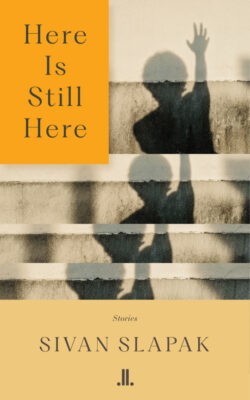In Sivan Slapak’s debut novel Here Is Still Here, we follow Isabel – born into a Montreal Jewish family in which the past casts overhanging shadows and the future holds the tenuous hope of fixing everything. Moving to Jerusalem first to study and then to live, Isabel navigates the contrasts and conflicts around her as she explores what identity, place, and belonging mean when here is less a place to settle than the ability to be present.

Here Is Still Here
Sivan Slapak
Linda Leith Publishing
$22.95
paper
240pp
9781773901466
Yet Isabel also fills her life with everything that is on offer. She joins a Yiddish library-nightclub, learns Arabic from a Palestinian coworker and Yiddish at a summer program in Lithuania, tries cardamom coffee, knafeh, tofu. A friend helps her take up running, and while attempting to shed her life as well as her weight, she encounters new people and parts of Jerusalem. “How the hell did I get here?” Isabel wonders as she signs up for her first marathon, unaware or simply in denial that her life has always been in movement, even when it felt like she was going nowhere.
Most men in Slapak’s novel slip in and out of Isabel’s life without sticking – boyfriends, one-night stands, neighbours, acquaintances, coworkers, rabbis, taxi drivers, and even friends. Only her father and the feral tomcat she finds keep their place in her peripheries, where she can love them at a distance without being hurt by their damage.
Isabel is grounded, instead, by the women around her. Her sister Loren is a steady presence, a link to the past, home, and family. Her friends in Jerusalem and Montreal – Miriam, Suri, Dikla, Amira – acknowledge Isabel’s pain and provide a balm in the form of food, advice, support, and friendship. Even her mother appears to see Isabel better than she can see herself. “You say you want to meet someone, but I’m not sure you do,” she tells her. “You have so many interesting friends.”
More than anyone else, it is her grandmother who frames Isabel’s life – her Bubbe, a Holocaust survivor who lost everyone and started over, in many ways stuck in the past, her grief a legacy but also permission for her family to keep living. “The woman was a wound,” Isabel says, and it is ultimately Isabel’s choice whether the wound she inherited will fester or heal.
Slapak’s prose is pensive and resonating, touching on truths about aging, family, friendship, and what makes a life, offering these to us through Isabel’s lens of traumatic history, self-doubt, and hope. “There are no ruins here,” Isabel thinks as she sits, not needing to be anywhere else, in the afternoon sun. “Just life happening.”
Here Is Still Here is a journey that will move you profoundly, no matter where you are.mRb






Truly admire how you can give a feeling of a story in just a few sentences. Bravo!!
Ms. Wayland’s review made me love Isabel so much. I can’t wait to read it.